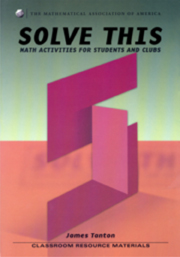Book contents
- Frontmatter
- Introduction
- Contents
- Part I Activities and Problem Statements
- Chapter 1 Distribution Dilemmas
- Chapter 2 Weird Shapes
- Chapter 3 Counting the Odds … and Evens
- Chapter 4 Dicing, Slicing and Avoiding the Bad Bits
- Chapter 5 “Impossible” Paper Tricks
- Chapter 6 Tiling Challenges
- Chapter 7 Things that Won't Fall Down
- Chapter 8 Möbius Madness: Tortuous Twists on a Classic Theme
- Chapter 9 The Infamous Bicycle Problem
- Chapter 10 Making Surfaces in 3- and 4-Dimensional Space
- Chapter 11 Paradoxes in Probability Theory
- Chapter 12 Don't Turn Around Just Once!
- Chapter 13 It's All in a Square
- Chapter 14 Bagel Math
- Chapter 15 Capturing Chaos
- Chapter 16 Who Has the Advantage
- Chapter 17 Laundry Math
- Chapter 18 Get Knotted!
- Chapter 19 Tiling and Walking
- Chapter 20 Automata Antics
- Chapter 21 Bubble Trouble
- Chapter 22 Halves and Doubles
- Chapter 23 Playing with Playing Cards
- Chapter 24 Map Mechanics
- Chapter 25 Weird Lotteries
- Chapter 26 Flipped Out
- Chapter 27 Parts that do not Add up to their Whole
- Chapter 28 Making the Sacrifice
- Chapter 29 Problems in Parity
- Chapter 30 Chessboard Maneuvers
- Part II Hints, Some Solutions and Further Thoughts
- Part III Solutions and Discussions
- References
- Index
Chapter 11 - Paradoxes in Probability Theory
from Part I - Activities and Problem Statements
- Frontmatter
- Introduction
- Contents
- Part I Activities and Problem Statements
- Chapter 1 Distribution Dilemmas
- Chapter 2 Weird Shapes
- Chapter 3 Counting the Odds … and Evens
- Chapter 4 Dicing, Slicing and Avoiding the Bad Bits
- Chapter 5 “Impossible” Paper Tricks
- Chapter 6 Tiling Challenges
- Chapter 7 Things that Won't Fall Down
- Chapter 8 Möbius Madness: Tortuous Twists on a Classic Theme
- Chapter 9 The Infamous Bicycle Problem
- Chapter 10 Making Surfaces in 3- and 4-Dimensional Space
- Chapter 11 Paradoxes in Probability Theory
- Chapter 12 Don't Turn Around Just Once!
- Chapter 13 It's All in a Square
- Chapter 14 Bagel Math
- Chapter 15 Capturing Chaos
- Chapter 16 Who Has the Advantage
- Chapter 17 Laundry Math
- Chapter 18 Get Knotted!
- Chapter 19 Tiling and Walking
- Chapter 20 Automata Antics
- Chapter 21 Bubble Trouble
- Chapter 22 Halves and Doubles
- Chapter 23 Playing with Playing Cards
- Chapter 24 Map Mechanics
- Chapter 25 Weird Lotteries
- Chapter 26 Flipped Out
- Chapter 27 Parts that do not Add up to their Whole
- Chapter 28 Making the Sacrifice
- Chapter 29 Problems in Parity
- Chapter 30 Chessboard Maneuvers
- Part II Hints, Some Solutions and Further Thoughts
- Part III Solutions and Discussions
- References
- Index
Summary
The Money or the Goat?
This classic puzzle from probability theory is known as the Monty Hall problem after the host of “Let's Make a Deal!” It was played as part of that TV game show.
Imagine you are a game show contestant with three closed doors before you. You are told that behind one of these doors is a prize of one million dollars in cash. Behind each of the other two are goats. You select a door, but before you open it, the host opens one of the two remaining doors to reveal—a goat! He now gives you the opportunity to stay with your original choice or switch to the remaining unopened door. What should you do? Switch doors or stay with your initial choice? Does it make any difference?
Double or … Double!!
A friend places before you two paper bags, both containing Tootsie Rollsd®. He tells you that one contains twice as many as the other and that you may keep the contents of one of the bags. You select a bag, open it up, and count the number of Tootsie Rolls® it contains. Your friend then gives you the option to change your mind and take instead (without peeking inside!) the contents of the other bag. Assuming you would like as many Tootsie Rolls® as possible (and you don't feel it is an insult to his generosity to switch), is it to your advantage to switch bags? Or is it better to stay with your first choice?
- Type
- Chapter
- Information
- Solve ThisMath Activities for Students and Clubs, pp. 25 - 26Publisher: Mathematical Association of AmericaPrint publication year: 2001



